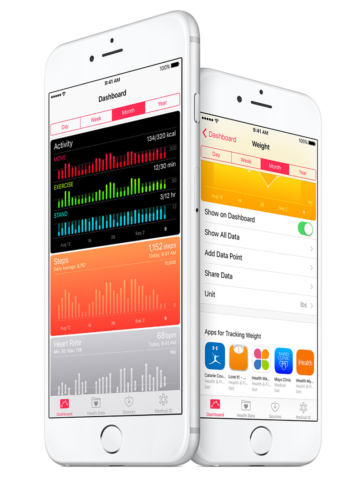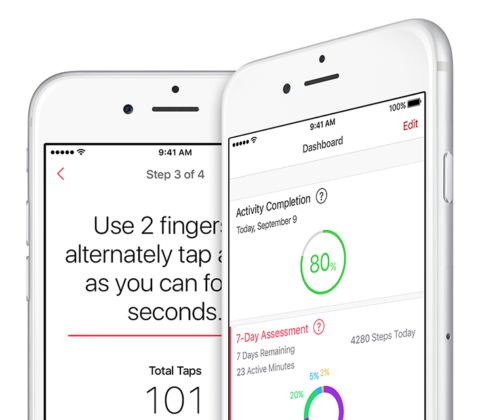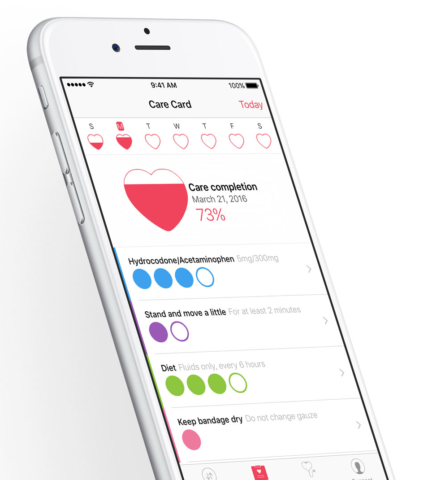Apple, Inc.: world pioneers in the fields of hardware, software and… healthcare?
Over the last few years, Apple has quietly built up an impressive suite of health technologies, though if you’re not a regular viewer of the company’s keynote presentations you’d be forgiven blissful ignorance of this fact. Apple has launched HealthKit, ResearchKit and CareKit to help users track their personal health, aid medical research and care for medical conditions.
These frameworks allow developers to create powerful health and fitness apps, integrating data captured by the sensors built into iPhones and Apple Watches. Heart rate, activity levels, sleep patterns. All trackable with a device already owned by hundreds of millions worldwide. Apple’s technologies are already being used to help diagnose autism, predict seizures, and manage diabetes. So: how can these technologies help today, and what does the future hold for a smart, digitized healthcare industry?
HealthKit
HealthKit launched in 2014 and is primarily used to collect data for health and fitness tracking apps, which have gained popularity quickly over the last few years. Any data you see in the Health app is there thanks to HealthKit’s integration with first- and third-party trackers, including wearables like Fitbit and the Apple Watch. But this data isn’t just used to help users lose a few pounds or tone those abs; the data can be fed into a number of more serious uses.

The Health app can track all kinds of data
One such feature already being used is Medical ID, a digital stat sheet of information about a user that can be accessed from the lock screen – without a password – in case of emergency. This includes basic information like name and date of birth in addition to optional details like blood type, medical conditions, allergies and emergency contact numbers. (If you haven’t already, you can and should configure your Medial ID from the Health app.)
The iPhone has a whole host of useful sensors: the accelerometer, gyroscope, and GPS functions can track physical movements while the camera and microphone can be used to keep check on other conditions. HealthKit is responsible for bringing all these functions together and allowing apps to share this data.
ResearchKit
ResearchKit, launched a little more than a year ago at Apple’s Spring Forward event, could go down as one of the most important changes in the medical research industry in, well, ever. The system will help provide data that doctors could previously only dream of. ResearchKit gives apps access to the data in the Health app, and allows volunteers to undergo simple tests and submit the details to medical studies. Since launching with five apps – covering heart disease, Parkinson’s, asthma, diabetes and breast cancer research – many more have been developed by academics around the world.

Volunteers can take part in simple research activities
Historically, medical research has been costly and time-consuming to perform, even with a limited sample size. For complicated testing that needs a doctor present that will remain the case, but there are a great many tests which can be automated using the sensors inside the iPhone. It makes research possible on a grander scale than ever before. For example, the MyHeart Counts app from Stanford University tracks daily activity levels to help calculate cardiovascular risk, and had more than 40,000 participants within just a few months of launching. Imagine if a doctor had to deal with each of them individually, in person.
Those with privacy concerns will be pleased to know that “users decide what to participate in and how to share it. Apple won’t see the data,” promised Apple SVP Jeff Williams when he launched the framework in 2015. Since then, Apple has championed encryption in a privacy stand-off with the FBI and redoubled its security efforts to ensure customer’s private data stays private. Apple’s earned our trust on this one.
CareKit
The last of Apple’s health platforms, CareKit, helps patients to track and manage illnesses and liaise with medical professionals without a doctor’s appointment. It’s an easy way to share detailed information that just wouldn’t have been possible a few years ago. Apple want to bridge the gap between patient and doctor, and also make it easier for patients to share their data with carers or loved ones.
Perhaps more importantly than sharing data with doctors, CareKit allows users to track their own symptoms and medications. Some of the apps utilizing it could be lifesaving: EpiWatch uses sensors on the Apple Watch to track epileptic seizures in the hope of understanding what triggers them, and can send a notification to someone you trust when a seizure is coming on. Apps can help to manage chronic conditions, not only as a reminder to take your meds but also to help learn which treatments are working.

These apps make home care so much easier
In the U.K., clinical commissioning groups are exploring the ways that “looking into healthcare apps to help patients to manage their conditions,” and it’s likely only a matter of time before these practices become mainstream. EMIS Health‘s Ben Foster says “it’s of most benefit with a patient with a long-term condition, that’s when we see them becoming more engaged,” explaining that for many users “it’s part of their lives and they want to manage it themselves more.” For this to really take off we’ll need to see more surgeries adopting compatible software, but even in its current stage CareKit can offer a lot of assistance to those suffering from long-term illnesses or requiring post-surgery care.
A healthier future?
Apple CEO Tim Cook believes that technology has the potential to change healthcare practices for the better, and he intends for Apple to play a significant part in the sea change to come. He wants to use the power and reach of the iPhone make it easier to diagnose and deal with illness, calling healthcare a “huge issue” in need of simplification.
Health tracking technology is still in its infancy, and companies are still figuring out ways to take advantage of all the data we now have at our fingertips. Connected smart gadgets will enter the mainstream over the next decade, and will hopefully evolve from $100 cups that tell you how much water to drink (no, really) into genuinely helpful health tracking devices.
As developers get more used to the power of these frameworks, we’ll hopefully see more creative endeavors like Sea Hero Quest, a game in which you can help fight dementia by chasing magical sea creatures around the ocean. Gamifying research could help it reach a wider audience, and the ubiquity of the iPhone – and smartphones in general – should mean that we start to see medical research on an unprecedented scale.

Playing Sea Hero Quest directly contributes to important research
Late Apple CEO Steve Jobs is said to have been a catalyst for Apple’s eventual foray into more personal products. TIME Magazine noted that prior to his death in 2011, Jobs “spent a great deal of time with doctors” and learned first hand “how disjointed the healthcare system can be.” He reportedly saw this as a problem for technology to fix, and his experiences in hospital are said to have indirectly contributed to the company developing the Apple Watch.
It’s likely Apple will add more biosensors to its devices in the future to get even more accurate data, and for certain illnesses accessories will be made to help track progress. It all adds up to a huge opportunity to streamline the healthcare industry, making a great deal of data capture and follow-up care seamless and autonomous.
For years we’ve thought that an apple a day keeps the doctor away, but in actual fact Apple is taking the first steps to bringing patients and doctors closer than ever. And that’s a great thing.

